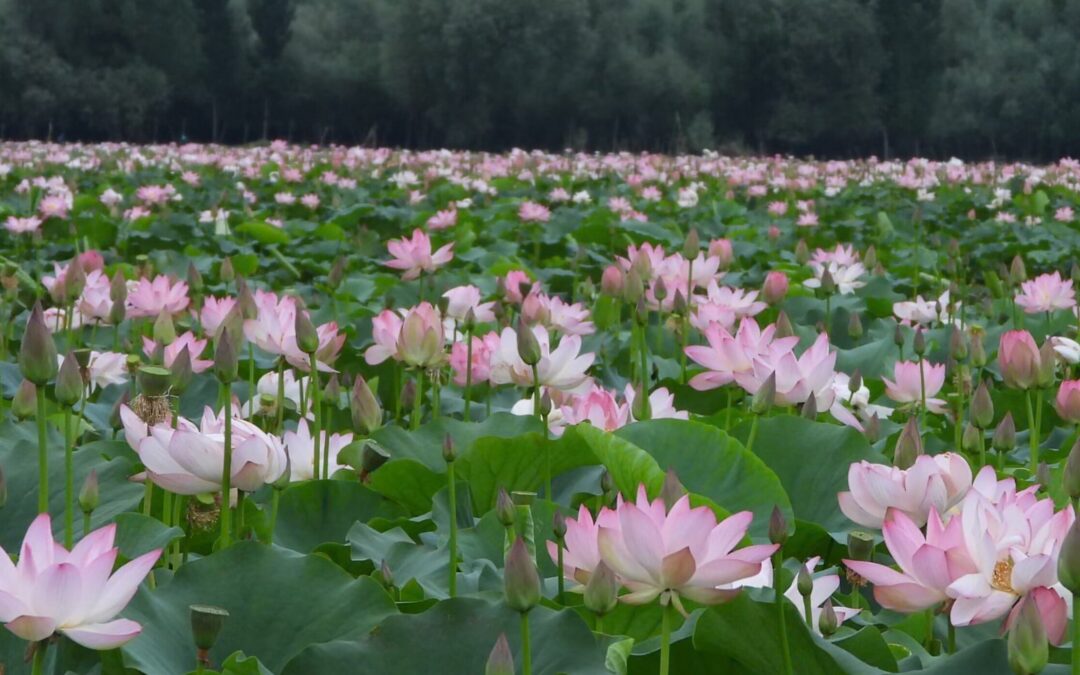Lotus flowers in Wular Lake, which have reappeared after three decades as a result of five years of conservation efforts. Photograph: Courtesy of Umar Dar
Joy And Relief As Lotus Flowers Bloom Again In Kashmiri Lake After Three Decades
by Tauseef Ahmad and Sajid Rain, The Guardian
We threw seeds into the lake hundreds of times, but nothing grew. It’s only now, after the silt was cleared, that we see the flowers again after nearly 33 years,” says Bashir Ahmad, a 65-year-old who fishes in Kashmir’s Wular Lake for his livelihood. Wular was once among Asia’s largest freshwater lakes. It lies in the Kashmir valley, about 18 miles (30km) north-west of Srinagar, at the foot of the Pir Panjal and Himalayan mountain ranges. It was renowned for its high-quality lotus plants, and sustained the livelihoods of more than 5,000 people who harvested and sold nadru – the edible lotus stem.
Aspen Trees Are Flourishing Again In Yellowstone For The First Time In 80 Years, Thanks To Gray Wolf’s Return
by Meghan Cook, GoodGoodGood
On January 12, 1995, a truck passed under the stone gateway of the Roosevelt Arch in Yellowstone National Park with precious cargo in tow: eight gray wolves from Alberta, Canada. As they were released into the park’s 2.2 million acres of wilderness, they became the first wolves to set foot in Wyoming since they had been hunted to the brink of extinction in the 1930s. In the wolves’ 60-year absence, the Rocky Mountain elk population grew wildly out of control, grazing on trees and undergrowth and obliterating the natural landscape in the process. In fact, by the 1990s, not a single quaking aspen tree sapling could be found.
Rediscovering Healing: How A Native Teen’s Ancestral Recipe Could Fight Cancer
by Wonderae
In a time where modern science often feels far removed from traditional ways of life, one remarkable teenager is proving that the two can walk hand in hand—and even heal together. Destany “Sky” Pete, a member of the Shoshone and Paiute Tribes from the Duck Valley Indian Reservation straddling the Idaho-Nevada border, made headlines with a discovery that is as inspiring as it is groundbreaking. Her journey began not in a laboratory, but in the heart of her community’s stories—stories about health, loss, and an old recipe nearly forgotten: toishabui, or chokecherry pudding.
Sweden Goes Cage-Free In Historic Animal Welfare Move
by Siân Yates, FoodBev
Sweden has officially transitioned to a cage-free system for hens, marking a historic victory for animal welfare group, Project 1882. This achievement makes Sweden the only country globally to eliminate the use of cages in egg production without a legal mandate, a feat accomplished through both extensive advocacy and corporate engagement. Project 1882 has spearheaded this initiative, leveraging years of advocacy, public campaigns and corporate dialogue to drive change in the Swedish egg industry. The organisation confirmed the absence of caged hens through data obtained from regional authorities and the egg sector.
Car Wash Hires All-Autistic Staff To Wash Away Barriers: 10 Years Later, There’s Now 4 Florida Locations
by Andy Corbley, Good News Network
In 2015, GNN reported on the opening of Rising Tide Car Wash in Florida, where a man’s autistic son could acquire all the merits of hard work, earn a paycheck, and become more independent. Now 10-years-later, founder John D’Eri’s original vision has been shared by thousands—both on the spectrum and off of it; both in the driver’s seat, and out of it. Washing, buffing, and waxing at Margate, Parkland, and Coral Springs, with a fourth location set for Pompano Bay in 2026, Rising Tide now employs 90 neurodivergent adults. When GNN first reported on the story they had just started, and managed 35 employees.


Recent Comments